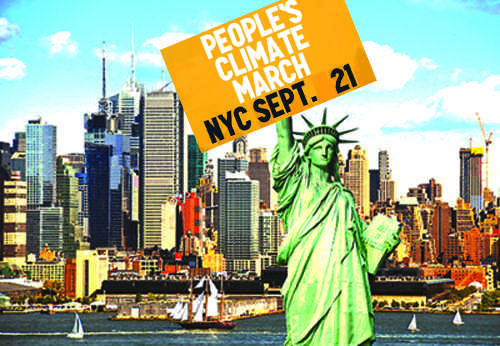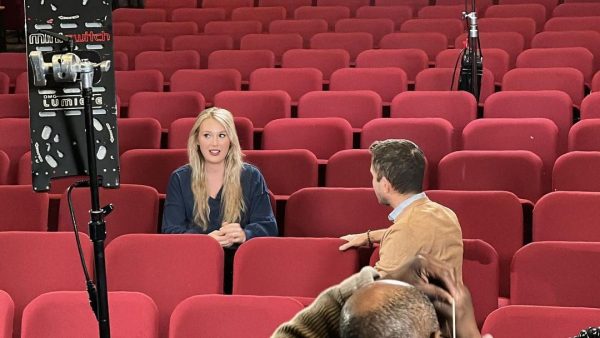Let’s reset the climate change clock

The People’s Climate March will start at 11:30 in NYC on Sunday Sep 21.
Looking for the chance to make history? What organizers are calling the People’s Climate March will be held in the streets of Manhattan, New York City on Sep 21 and is predicted to be the largest environmental march in history.
For years, humanity has been hearing about the ominous perils of global warming. At first, many did not believe it could actually exist.
I mean, come on, could the entire climate of Earth really change drastically and potentially make our planet uninhabitable? The answer is yes.
The climate fluctuates naturally over the course of thousands of years. However, if you look at a graph of the atmosphere’s carbon dioxide content (CO2), levels have shot up in a severe vertical line since the start of the Industrial Revolution.
The global community has established 350 parts per million (ppm) of carbon dioxide in the air as the highest safe level of carbon dioxide for a livable planet.
In the spring of 2014, CO2 levels reached just over 400 ppm, which is unprecedented in all of human history. In other words, we are in really bad shape.
Carbon dioxide is a greenhouse gas, which means that it traps heat in our environment. The excess levels of CO2 have been causing our environment to heat up in the past decades at an unnatural rate.
This warming climate causes Arctic ice caps to shrink, which results in rising sea levels. New York City, New Orleans and Miami are all cities that are in danger of sinking further into the ocean. Climate scientists are expecting sea levels to rise one foot by 2050.
Personally, I’d rather not live in a world without the beautiful, vibrant and cultured place that is New Orleans, Louisiana. I have so many fond childhood memories of summers in the city, riding the streetcar and walking down the streets of the French Quarter with relatives.
Rising sea levels would also affect the residents of the surrounding land. The field where I rode horses on my Aunt’s property could be flooded with water, made into marshlands like so much of the disappearing Louisiana boot.
Humanity’s addiction to pollution is not one that we can quit cold turkey. It’s going to take decades, perhaps centuries for us to significantly reduce our pollution levels and help the planet heal.
The best part about our dilemma? We already have a solution! There are two completely clean sources of energy at our fingertips: solar and wind energy.
It would be awesome if we could all set up solar panels on our roofs, but alas, for many of us that’s just not practical in the densely populated D.C. metropolitan area.
One thing we are good at, though, is getting together and speaking our minds. For everyone who is tired of feeling hopeless and helpless in the face of impending doom, the People’s Climate March is for you.
The march is being hosted by over a thousand special interest organizations that work to put pressure on world leaders to combat climate change.
Several famous people have endorsed this march, spreading awareness around the world. Celebrities such as Brad Pitt, Ian Somerhalder and World Cup star Leo Messi have supported the march and are helping to bring it to fruition.
Many of my friends have asked me, “What’s the point of marching? How will it help stop climate change?”
Freedom of assembly, one of the five freedoms listed in the First Amendment to the U.S. Constitution, can actually have more of an impact than people realize.
Think about it this way: major societal change can only be achieved if people discuss, organize and enact major social movements.
Take any event in history – the American Revolution, the civil rights movement, women’s suffrage, the Indian independence movement – all of these operations took people power to succeed.
Not only will the march include people power, but we have timed the demonstration just right so that it coincides with the UN summit of world leaders meeting to discuss the climate crisis.
With such a massive movement of people gathering in the streets right outside the windows of their meeting, it will be hard for world leaders to ignore the urgency of the issue. The demonstration may just be the spark we need to finally create meaningful action.
“The scientific facts on climate change are shocking,” Ruth Ngolela said, a masters student at Yale Schools of Forestry and Environmental Studies and Business who will be attending the climate march and works on climate change issues.
“It’s not just about the planet anymore, it’s about us being able to live on this planet.”
“The most powerful thing that people can do right now is realize that this is NOT an environmental issue,” Ngolela said.
“This is not about the polar bears, as cute as they are. It’s not even really about the planet. The Earth will survive without us. It is about the ability of our species to survive on this planet.”
I think we can all agree on one thing: it would be best to keep the human race alive. It’s funny, we think of solving climate change as a way to save the world, but really, it’s a way to save our own behinds. Stopping global warming is about self-preservation, folks.
This issue has already wreaked havoc on our society in more ways than one. The White House estimates that climate and weather disasters cost the U.S. economy more than $100 billion dollars in 2012 alone. Some island nations have already declared their lands uninhabitable and are seeking help for evacuating their citizens.
“Who are the people most affected by these climate disasters? Those without the resources to adapt,” Ngolela said. “This is a climate justice issue.”
America has already seen the ramifications of failing climate justice. When Katrina hit New Orleans in 2005, the people trapped within the city during the worst part of the storm were often the poorest citizens.
The Superdome, the football stadium at the center of New Orleans, was so filled with people that many were turned away. People resorted to staking out roof tops and raiding stores to survive.
Watching news coverage of this disaster on television was the first time I was exposed to the extreme impacts climate change can have. Even in my seven year old mind, I felt that this catastrophe could happen again if we didn’t change something.
Don’t despair yet. There is still so much we can do to solve this global crisis. The first order of business? Be there on the streets of New York as we voice our concerns and start to fix the fate of the world.
“This is the issue of our generation!” Ngolela said.
“Don’t miss this chance to be part of an epic movement.”
To learn more about the movement behind the march, go to: peoplesclimate.org

Sarah Metzel is the current Editorals Editor of The A-Blast. She joined the staff sophomore year as a staff writer.
Metzel was accepted into the Young...








